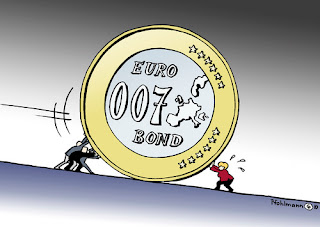
Stefano Pietrosanti
-bond seems to speak of and stars showing more than a passing fad, a brilliant idea or a handkerchief pocket to show off in the ministerial meeting. At first glance it might seem a good sign, especially for proponents of a European state that is not afraid of itself and protect its citizens. But let us reflect together.
A warning him to be Professor Spaventa in his speech at a recent conference on fiscal risks La Sapienza University in Rome, making (and making) the question: "What are e-bonds to fund these?"
Why the most popular hypothesis is that these European bonds serve to renew a fraction of pre-existing national debts, becoming part of the solvency insurance to investors and partly continental instruments of a market for credit facilities which the Member may access to refinance a certain amount of debt, maybe - I'm thinking - the new marginal share, or more at risk and more difficult to finance.
Even this could be a step forward, but there is a gap between such an operation and a European debt issuance to finance European projects that tomorrow will make life easier for EU citizens, users of the large continental services built with the effort - at least financial - of all.
The problem, as ever clear and obvious, it's damn dangerous to bring together institutions of small, often powerless and resentful as always our national homeland, with a theoretical mastodon-Union but is represented by a political class normally quiescent and defeatist, it looks too many times to herself as entitled not by will of the majority of European citizens, but the indulgence of nations. In such a situation, with the push and pull inherent in a painful crisis in the long run, it appears possible that the short-term thinking of the rulers become - through a federal institution which would be a truly European public debt - bad in Europe -company of their dysfunctional parents.
If you make a debt mainland, but the legitimacy of the democratic decision of last instance is at the national level, one might start to a morass of lawsuits over who should pay what. So the EU institutions put their face in the markets without asking for a modicum of sovereignty over and above without having a clear voice and ready to defend them if, in a not too distant future, someone tried to pass it off as "leeches seeking interest, plucking the poor defenseless nations, "nonsense that already seems to feel in the mouth of those who can maintain that it is not harmful, and even desirable for a possible return to national currencies.
There a fundamental question that the Europeans should take in its concreteness annoying: their democratic vote leading to the election of persons who are less able to change the popular legitimacy that is given a share in government policy. Governments that can not govern, or who can not give concrete shape to the popular will and rational, they tend to legitimize the role of parliaments in snatch, or believe they are repositories of sovereignty, when instead of sovereignty should be and performers; hence, to preserve its role as a ruling class as such (once said oligarchies) pace is very quick and maybe already made.
0 comments:
Post a Comment